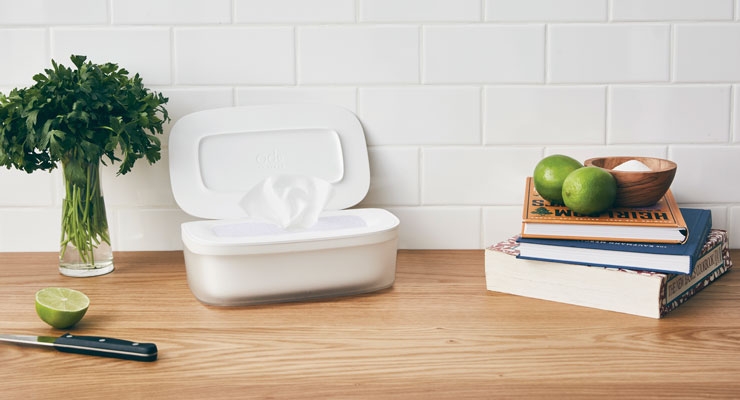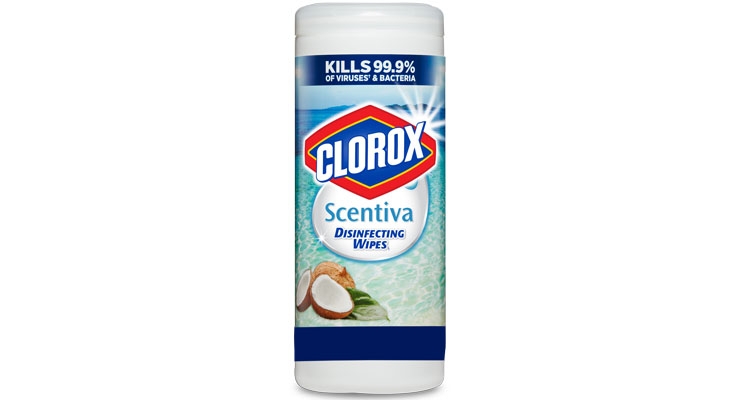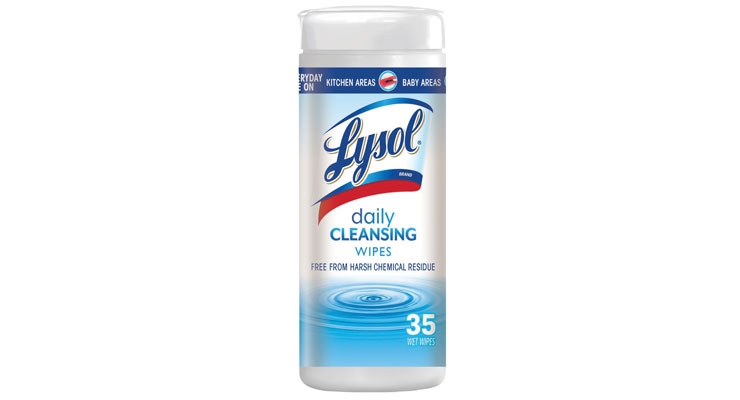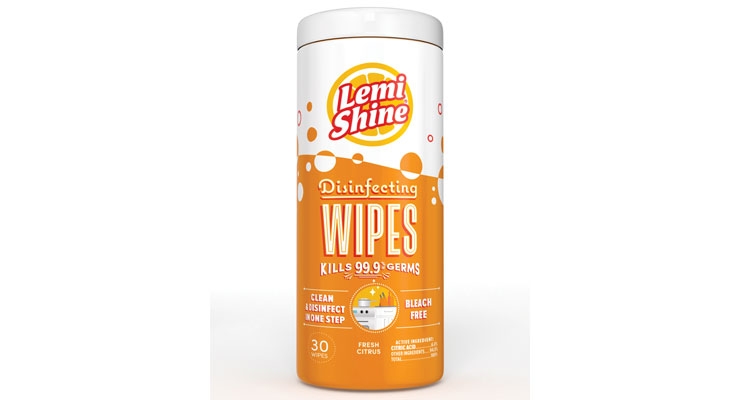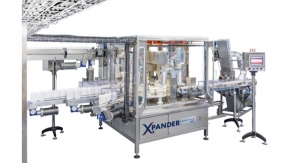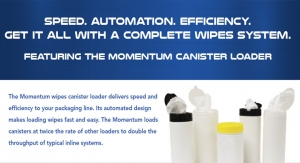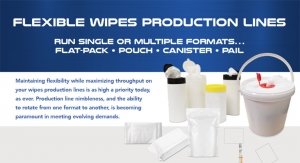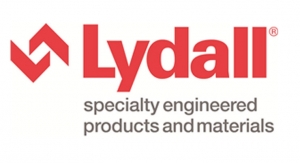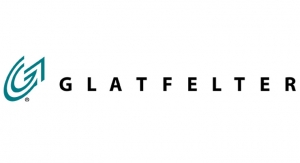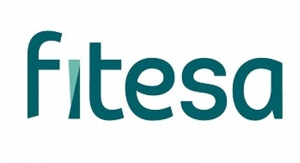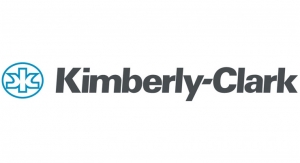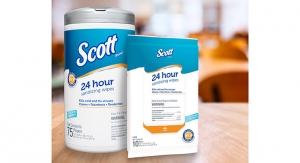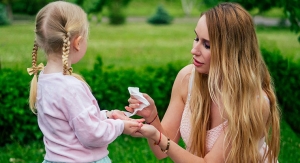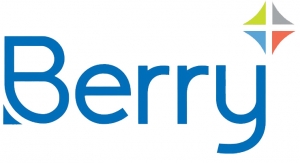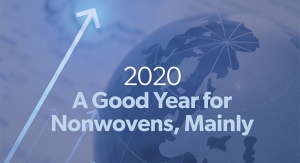Tara Olivo, Associate Editor06.01.18
Consumers hard-pressed for time between long hours at work, family obligations, and other commitments are finding value in products that make their cleaning responsibilities simpler and easier. Thus, time-strapped consumers are choosing household wipes over other cleaning methods due to this need for ease and convenience.
Today, there is a wipe for practically every application; there are the standard all-purpose wet wipes, disinfectant wipes, dry electrostatic floor cleaning wipes, furniture wipes, glass wipes, and toilet cleaning wipes. Companies like Honest and Grab Green offer wet dryer sheets that are reusable—each one can handle two loads of laundry—that are fragrance free and are made without harsh additives, and there’s even a new wipe from Granite Gold that easily seals natural-stone surfaces.
“Many consumers who were slow to adapt to the wet wipe trend in the past are now finding the convenience factor and experience of using wet wipes beneficial and time saving. In addition, consumers are now placing cleaning wipes in more rooms of the house,” says Michael Wettstein, VP sales for contract manufacturer Kleen Test Products.
Wettstein says the household wipes market is continuing to experience year-over-year growth, and this growth is coming from increased household penetration of consumers who are now adding wet wipes to their shopping list.
Jeff Slosman, president of National Wiper Alliance, which makes custom-converted, private label wipes and floor pads for the household market, believes growth in this market will continue to occur as a result of many factors. “Advances in technology result in new materials being developed and thus new items introduced in the category,” he says. “Consumers are also looking for convenience. Nonwoven wipes have been taking marketshare from traditional textile products in the industrial and food service market for years. Employees that have been using them at work are seeking out products that will offer the same convenience and benefits for their home.”
According to a report by market research company Technavio, the household wipes category is the next highest growing segment after personal care wipes, and it is expected to remain so during the next five years.
Technavio reports that the growth of household wipes is due to the modernizing and changing consumer lifestyle coupled with rising awareness for cleaning and hygiene products. Also lending support to the growth of this category is product innovation, uniqueness, branding, and growing organized retail in various countries in the Asia Pacific (APAC) region. Further, Technavio confirms that household wipes are gaining demand in households across the globe due to the convenience it offers across several applications.
Major demand for household wipes last year was witnessed by North America and Western Europe while the East Asia region is expected to have the highest growth rate during next five years, according to the report. Also, the growth in the household wipes market is widely connected to economic growth.
The three main trends in the market identified by Technavio are increased preference for disposable wipes, increased demand for eco-friendly and biodegradable wipes and growing adoption of scented wipes.
Kleen Test Products is also witnessing a growing trend of custom fragrances in the household wipes market. “There are trends toward experiential scents to give the consumer an enjoyable cleaning experience. We are seeing everything from more natural-smelling fragrances to higher end custom blends,” Wettstein explains.
Major Players Focus on Innovation
Clorox’s grasp in the home care wipes market remains strong.
In the cloth all-purpose cleaner category, Clorox is No. 1 in sales in U.S. multi-outlets, according to IRI, a Chicago-based market research firm. Clorox’s sales in this category reached $386 million for the 52 weeks ending March 25, 2018. Private label cloths come in at No. 2 in the category, reaching $166 million in sales during the same time period.
Clorox, which first entered the disinfectant wipes category in 1999, continues to expand its range of home wipes offerings. Earlier this year the company launched its signature disinfecting wipes in a new packaging format. Clorox Disinfecting Wipes Easy To Pull’s new packaging allows for easy storing and stacking in addition to being great for taking on the go. The Flex Pack Singles wipes are the same as traditional Clorox Disinfecting Wipes and kill 99.9% of viruses and bacteria making them both efficient and easy to use. Also introduced this year were Clorox Disinfecting Wipes Ultra Strength, which are three times stronger than a wet paper towel. The new design includes tough blue fibers and grime-catching ridges to tackle the toughest of messes.
“Our new wipes products were specially developed to meet the demand we were hearing from consumers to find new ways to bring the Clorox wipes cleaning and disinfecting experience they love to new occasions in the home and on the go,” says Deb Crandall, associate director marketing, Clorox. “Specifically Clorox Disinfecting Wipes Easy to Pull gives you the wipe you know and love in a new, flexible package that’s easier to open, use, store and take with you on the go without having to find space for the bulky canister.”
The company also expanded its Scentiva range of products that first launched last year. Clorox Scentiva Pacific Breeze & Coconut joined the original Scentiva fragrances Tuscan Lavender & Jasmine and Hawaiian Sunshine. Clorox Scentiva Disinfecting Wipes also kill 99.9% of viruses and bacteria on hard, nonporous surfaces. They also work on finished hardwood, sealed granite and stainless steel.
Lysol is also in on the scented wipe trend. The brand now offers Lysol Disinfecting Wipes in Brighter Horizon and Brand New Day fragrances. Brighter Horizon features a unique country fragrance, while Brand New Day emits a tropical aroma. Like its original disinfecting wipes, the scented versions kill 99.9% of viruses, bacteria and fungi, including eight cold & flu viruses on hard surfaces such as kitchen counters, bathrooms, fitness equipment, as well as on electronics including smartphones, tablets and remote controls.
A Greener Clean
Another trait becoming more valued in wipes is an eco-friendly or less-is-more trend, with consumers desiring household products that have simplified ingredients.
That’s why last month Lysol added Daily Cleansing Wipes to its portfolio. Made from three simple ingredients—water, salt and hypochlorous—the wipes are free from harsh chemical residue are safe for everyday use around the home, including food prep areas, baby areas—such as high chairs, pacifiers and changing tables—and pet bowls and toys. The formulation kills 99.9% of germs, including E. coli and salmonella.
For its part, nontoxic household cleaning products company Lemi Shine has introduced new citric-powered wipes that disinfect without harsh chemicals.
Launching exclusively in Texas, the new lineup includes the company’s first ever nontoxic Disinfecting Wipes that are formulated with safe, germ-killing citric acid that eliminates 99.9% of household bacteria. The wipes, available in 30- or 70-count packages, are EPA-certified as a DFE (Design For the Environment) product.
“We are always working to add new and innovative products that are powerful and safe, and our new Disinfecting Wipes break new ground in the home cleaning products category,” says Meagan Gates, brand manager, Lemi Shine. “Our products bridge the gap between chemical-heavy conventional brands and feeble natural products to meet the needs of a growing segment of consumers seeking safer products that are still effective. As we evaluated new spaces in household cleaning that we could enter, disinfecting wipes seemed like a no-brainer.”
Meanwhile, new company Solugen has developed a truly “green” wipe—from the wiping material to the cleaning solution. Ode to Clean wipes are based on a spunlace nonwoven made of 100% polylactide (PLA) and Bioperoxide, one of the purest forms of hydrogen peroxide created using Solugen’s proprietary technology.
Solugen was founded in 2016 by CEO Gaurab Chakrabarti, M.D., Ph.D., and CTO Sean Hunt, Ph.D. Dr. Chakrabarti discovered a unique enzyme that produced hydrogen peroxide using an extremely efficient and ultra-pure method from sugar sources during his M.D. and Ph.D. training in oncology at the University of Texas Southwestern. Dr. Hunt was completing his Ph.D on nanoparticle synthesis for hydrogen peroxide production at the Massachusetts Institute of Technology (MIT).
Through their combined expertise, Drs. Hunt and Chakrabarti saw an opportunity to apply their work to the field of hydrogen peroxide manufacturing, a typically energy-intensive and dangerous process that relies on non-renewable resources like petroleum and produces hazardous byproducts.
“We looked into how hydrogen peroxide is currently made, and it’s just atrocious,” explains Dr. Chakrabarti. “For every pound of peroxide, 0.1 lbs. of carbon dioxide is made, and they’re using 500 gallons of a petroleum-based solvent per minute. It’s excessive, but what’s even worse is one of these facilities explodes per year.”
With the help of a $10,000 grant from MIT, Drs. Hunt and Chakrabarti began working on a project to see if they could make hydrogen peroxide better than the way it’s currently made, but on a bigger scale. The doctors bought supplies from Home Depot to build a reactor for their enzyme, and they started making what they call Bioperoxide.
Next, Dr. Chakrabarti says, they tried to figure out the best way to get it out to the world. After talking to family, friends, customers—anyone they knew—they found out people would be interested in using Bioperoxide in a cleaning product, and more importantly, they wanted it in a convenient application like a wipe.
“The issue was that wipes are not the most sustainable product on the market and that kind of goes against our whole mission of being environmentally sustainable,” Dr. Chakrabarti recalls. “So we asked the simple question—would it be possible to create a wipe product that comes from plant starch as well?”
Solugen ultimately teamed up with a company that makes PLA to create the world’s first wipe made completely with plant starch; the PLA-based wipe material is 100% biodegradable and compostable, and the peroxide solution on the wipe is also derived from plant starch.
Ode to Wipes officially launched in October 2017, and within the first week of launch, it sold out of its inventory. “We realized there might be some type of demand here,” Dr. Chakrabarti says. “We found a little niche for ourselves—what people really wanted was a more sustainable convenient cleaning solution, but they didn’t want to sacrifice on efficacy. The way we think about the work that we’re doing with Ode to Clean is we want to give the same efficacy as a Clorox, but without any of the toxins or the environmental impact. The only way to do that, I believe, was to make those ingredients ourselves starting from plant starches.”
This innovation has garnered attention from INDA, the Association of the Nonwoven Fabrics Industry. Ode to Clean wipes are nominated for INDA’s 2018 World of Wipes Innovation Award.
“This is a very important award,” Dr. Chakrabarti says. “At the end of the day, people don’t realize how impactful wipes are to peoples’ lives and to the environment. So if we could even make a small change in the way that we wipe, to a more sustainable way of doing it, I think the benefits are going to be compounded over a long period of time and make a huge impact. I’m very excited because I think it can push these compostable wipes into the mainstream.”
Ultimately, the team aims to license their proprietary micromanufacturing technology to major chemical companies to use in their own hydrogen peroxide manufacturing or as an end user, helping to reduce the broader environmental impact that chemical manufacturing has on the environment.
Meanwhile, a new product from National Wiper Alliance is being recognized by INDA. The company’s newest launch for the household market, the patented Rhino Wipe Tote System, has also earned a nomination for the World of Wipes Innovation Award.
The innovative Rhino Wipe Tote System is an ideal solution to solving the everyday use of wasted paper towels. The Tote System features a carry handle and two adjustable straps with locking clips to attach the water resistant dispenser to anything for easy dispensing of the Rhino wipes.
The Rhino Wipe Tote System is refillable, versatile and portable designed for active lifestyles. The Rhino Wipe itself is binder and chemical free, cloth-like, reusable and stronger than paper towels, whether wet or dry.
Today, there is a wipe for practically every application; there are the standard all-purpose wet wipes, disinfectant wipes, dry electrostatic floor cleaning wipes, furniture wipes, glass wipes, and toilet cleaning wipes. Companies like Honest and Grab Green offer wet dryer sheets that are reusable—each one can handle two loads of laundry—that are fragrance free and are made without harsh additives, and there’s even a new wipe from Granite Gold that easily seals natural-stone surfaces.
“Many consumers who were slow to adapt to the wet wipe trend in the past are now finding the convenience factor and experience of using wet wipes beneficial and time saving. In addition, consumers are now placing cleaning wipes in more rooms of the house,” says Michael Wettstein, VP sales for contract manufacturer Kleen Test Products.
Wettstein says the household wipes market is continuing to experience year-over-year growth, and this growth is coming from increased household penetration of consumers who are now adding wet wipes to their shopping list.
Jeff Slosman, president of National Wiper Alliance, which makes custom-converted, private label wipes and floor pads for the household market, believes growth in this market will continue to occur as a result of many factors. “Advances in technology result in new materials being developed and thus new items introduced in the category,” he says. “Consumers are also looking for convenience. Nonwoven wipes have been taking marketshare from traditional textile products in the industrial and food service market for years. Employees that have been using them at work are seeking out products that will offer the same convenience and benefits for their home.”
According to a report by market research company Technavio, the household wipes category is the next highest growing segment after personal care wipes, and it is expected to remain so during the next five years.
Technavio reports that the growth of household wipes is due to the modernizing and changing consumer lifestyle coupled with rising awareness for cleaning and hygiene products. Also lending support to the growth of this category is product innovation, uniqueness, branding, and growing organized retail in various countries in the Asia Pacific (APAC) region. Further, Technavio confirms that household wipes are gaining demand in households across the globe due to the convenience it offers across several applications.
Major demand for household wipes last year was witnessed by North America and Western Europe while the East Asia region is expected to have the highest growth rate during next five years, according to the report. Also, the growth in the household wipes market is widely connected to economic growth.
The three main trends in the market identified by Technavio are increased preference for disposable wipes, increased demand for eco-friendly and biodegradable wipes and growing adoption of scented wipes.
Kleen Test Products is also witnessing a growing trend of custom fragrances in the household wipes market. “There are trends toward experiential scents to give the consumer an enjoyable cleaning experience. We are seeing everything from more natural-smelling fragrances to higher end custom blends,” Wettstein explains.
Major Players Focus on Innovation
Clorox’s grasp in the home care wipes market remains strong.
In the cloth all-purpose cleaner category, Clorox is No. 1 in sales in U.S. multi-outlets, according to IRI, a Chicago-based market research firm. Clorox’s sales in this category reached $386 million for the 52 weeks ending March 25, 2018. Private label cloths come in at No. 2 in the category, reaching $166 million in sales during the same time period.
Clorox, which first entered the disinfectant wipes category in 1999, continues to expand its range of home wipes offerings. Earlier this year the company launched its signature disinfecting wipes in a new packaging format. Clorox Disinfecting Wipes Easy To Pull’s new packaging allows for easy storing and stacking in addition to being great for taking on the go. The Flex Pack Singles wipes are the same as traditional Clorox Disinfecting Wipes and kill 99.9% of viruses and bacteria making them both efficient and easy to use. Also introduced this year were Clorox Disinfecting Wipes Ultra Strength, which are three times stronger than a wet paper towel. The new design includes tough blue fibers and grime-catching ridges to tackle the toughest of messes.
“Our new wipes products were specially developed to meet the demand we were hearing from consumers to find new ways to bring the Clorox wipes cleaning and disinfecting experience they love to new occasions in the home and on the go,” says Deb Crandall, associate director marketing, Clorox. “Specifically Clorox Disinfecting Wipes Easy to Pull gives you the wipe you know and love in a new, flexible package that’s easier to open, use, store and take with you on the go without having to find space for the bulky canister.”
The company also expanded its Scentiva range of products that first launched last year. Clorox Scentiva Pacific Breeze & Coconut joined the original Scentiva fragrances Tuscan Lavender & Jasmine and Hawaiian Sunshine. Clorox Scentiva Disinfecting Wipes also kill 99.9% of viruses and bacteria on hard, nonporous surfaces. They also work on finished hardwood, sealed granite and stainless steel.
Lysol is also in on the scented wipe trend. The brand now offers Lysol Disinfecting Wipes in Brighter Horizon and Brand New Day fragrances. Brighter Horizon features a unique country fragrance, while Brand New Day emits a tropical aroma. Like its original disinfecting wipes, the scented versions kill 99.9% of viruses, bacteria and fungi, including eight cold & flu viruses on hard surfaces such as kitchen counters, bathrooms, fitness equipment, as well as on electronics including smartphones, tablets and remote controls.
A Greener Clean
Another trait becoming more valued in wipes is an eco-friendly or less-is-more trend, with consumers desiring household products that have simplified ingredients.
That’s why last month Lysol added Daily Cleansing Wipes to its portfolio. Made from three simple ingredients—water, salt and hypochlorous—the wipes are free from harsh chemical residue are safe for everyday use around the home, including food prep areas, baby areas—such as high chairs, pacifiers and changing tables—and pet bowls and toys. The formulation kills 99.9% of germs, including E. coli and salmonella.
For its part, nontoxic household cleaning products company Lemi Shine has introduced new citric-powered wipes that disinfect without harsh chemicals.
Launching exclusively in Texas, the new lineup includes the company’s first ever nontoxic Disinfecting Wipes that are formulated with safe, germ-killing citric acid that eliminates 99.9% of household bacteria. The wipes, available in 30- or 70-count packages, are EPA-certified as a DFE (Design For the Environment) product.
“We are always working to add new and innovative products that are powerful and safe, and our new Disinfecting Wipes break new ground in the home cleaning products category,” says Meagan Gates, brand manager, Lemi Shine. “Our products bridge the gap between chemical-heavy conventional brands and feeble natural products to meet the needs of a growing segment of consumers seeking safer products that are still effective. As we evaluated new spaces in household cleaning that we could enter, disinfecting wipes seemed like a no-brainer.”
Meanwhile, new company Solugen has developed a truly “green” wipe—from the wiping material to the cleaning solution. Ode to Clean wipes are based on a spunlace nonwoven made of 100% polylactide (PLA) and Bioperoxide, one of the purest forms of hydrogen peroxide created using Solugen’s proprietary technology.
Solugen was founded in 2016 by CEO Gaurab Chakrabarti, M.D., Ph.D., and CTO Sean Hunt, Ph.D. Dr. Chakrabarti discovered a unique enzyme that produced hydrogen peroxide using an extremely efficient and ultra-pure method from sugar sources during his M.D. and Ph.D. training in oncology at the University of Texas Southwestern. Dr. Hunt was completing his Ph.D on nanoparticle synthesis for hydrogen peroxide production at the Massachusetts Institute of Technology (MIT).
Through their combined expertise, Drs. Hunt and Chakrabarti saw an opportunity to apply their work to the field of hydrogen peroxide manufacturing, a typically energy-intensive and dangerous process that relies on non-renewable resources like petroleum and produces hazardous byproducts.
“We looked into how hydrogen peroxide is currently made, and it’s just atrocious,” explains Dr. Chakrabarti. “For every pound of peroxide, 0.1 lbs. of carbon dioxide is made, and they’re using 500 gallons of a petroleum-based solvent per minute. It’s excessive, but what’s even worse is one of these facilities explodes per year.”
With the help of a $10,000 grant from MIT, Drs. Hunt and Chakrabarti began working on a project to see if they could make hydrogen peroxide better than the way it’s currently made, but on a bigger scale. The doctors bought supplies from Home Depot to build a reactor for their enzyme, and they started making what they call Bioperoxide.
Next, Dr. Chakrabarti says, they tried to figure out the best way to get it out to the world. After talking to family, friends, customers—anyone they knew—they found out people would be interested in using Bioperoxide in a cleaning product, and more importantly, they wanted it in a convenient application like a wipe.
“The issue was that wipes are not the most sustainable product on the market and that kind of goes against our whole mission of being environmentally sustainable,” Dr. Chakrabarti recalls. “So we asked the simple question—would it be possible to create a wipe product that comes from plant starch as well?”
Solugen ultimately teamed up with a company that makes PLA to create the world’s first wipe made completely with plant starch; the PLA-based wipe material is 100% biodegradable and compostable, and the peroxide solution on the wipe is also derived from plant starch.
Ode to Wipes officially launched in October 2017, and within the first week of launch, it sold out of its inventory. “We realized there might be some type of demand here,” Dr. Chakrabarti says. “We found a little niche for ourselves—what people really wanted was a more sustainable convenient cleaning solution, but they didn’t want to sacrifice on efficacy. The way we think about the work that we’re doing with Ode to Clean is we want to give the same efficacy as a Clorox, but without any of the toxins or the environmental impact. The only way to do that, I believe, was to make those ingredients ourselves starting from plant starches.”
This innovation has garnered attention from INDA, the Association of the Nonwoven Fabrics Industry. Ode to Clean wipes are nominated for INDA’s 2018 World of Wipes Innovation Award.
“This is a very important award,” Dr. Chakrabarti says. “At the end of the day, people don’t realize how impactful wipes are to peoples’ lives and to the environment. So if we could even make a small change in the way that we wipe, to a more sustainable way of doing it, I think the benefits are going to be compounded over a long period of time and make a huge impact. I’m very excited because I think it can push these compostable wipes into the mainstream.”
Ultimately, the team aims to license their proprietary micromanufacturing technology to major chemical companies to use in their own hydrogen peroxide manufacturing or as an end user, helping to reduce the broader environmental impact that chemical manufacturing has on the environment.
Meanwhile, a new product from National Wiper Alliance is being recognized by INDA. The company’s newest launch for the household market, the patented Rhino Wipe Tote System, has also earned a nomination for the World of Wipes Innovation Award.
The innovative Rhino Wipe Tote System is an ideal solution to solving the everyday use of wasted paper towels. The Tote System features a carry handle and two adjustable straps with locking clips to attach the water resistant dispenser to anything for easy dispensing of the Rhino wipes.
The Rhino Wipe Tote System is refillable, versatile and portable designed for active lifestyles. The Rhino Wipe itself is binder and chemical free, cloth-like, reusable and stronger than paper towels, whether wet or dry.

